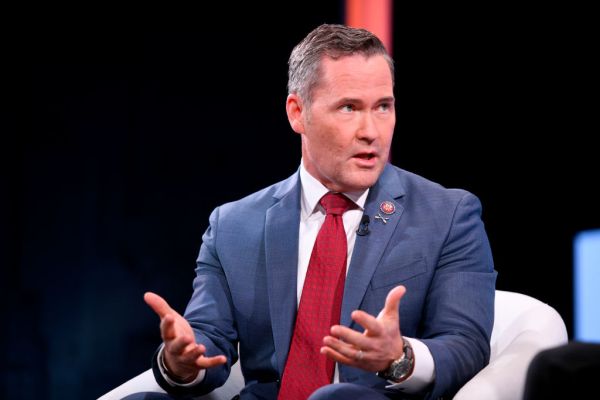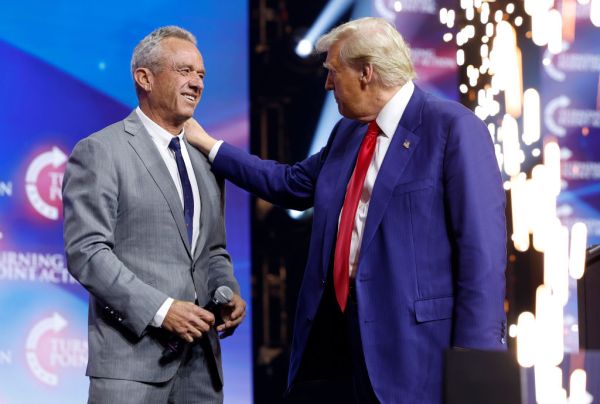On a drizzly afternoon last week in the cozy basement of a Capitol Hill rowhouse, Steve Bannon sat back in his chair, blinked, and sighed. “That was a big win,” he said.
Matt Gaetz, the former Florida congressman, had just a day earlier withdrawn his nomination as attorney general. Bannon blinked again, as if to check one more time that he had not been dreaming and that it had really happened. “Gaetz was a big win,” he admitted.
Not a big win for Bannon, of course, who considers Gaetz a close ally and a key piece of the MAGA movement’s plan to upend the administrative state and bring about a populist, economic nationalist revolution to the federal government in Donald Trump's forthcoming second term. No, Gaetz’s withdrawal was a big win for the establishment—the mainstream media, the non-MAGA remnants within the Republican Party, and of course, Mitch McConnell. The Kentucky senator is on his way out as the GOP leader, but the hand of McConnell still looms over the conference he has led since 2007.
“You gotta give the devil its due,” said Bannon.
It was the only moment during our 45-minute conversation on Friday that Bannon’s voice let slip a hint of resignation, reflecting on this significant setback. For Bannon, the operative posture is go, go, go, charge forward, never blink.
“Matt Gaetz was the best of the best,” he said on the Thursday afternoon edition of War Room—his live news show that airs at least four hours a day on the right-wing cable and streaming network Real America’s Voice and is also distributed as a podcast—hours after Gaetz’s surprise withdrawal. “You know what we say here in the War Room? Wait for it. Wait for it. ‘Next man up.’”
From Bannon’s basement, the War Room and the organized MAGA movement are working hard to shape the second Trump administration in their image—“assisting the transition” is how he puts it. That means pushing back on insufficiently populist picks before they’re made. It means rallying around selections like Robert F. Kennedy Jr. for Health and Human Services secretary and Tulsi Gabbard for director of national intelligence. It also means publicly shaming Republicans who appear to be deviating from the Trump line on these nominations. (“Folks in Utah, you’ve got a prooooblem,” he said on his show of John Curtis, the newly elected Republican senator whom Bannon calls a “Romney clone” and suspected of being a hard “no” on Gaetz.)
Perhaps as important as the personnel selections themselves is the perception of who has the power in the new Washington. The Gaetz fiasco was a stark reminder to Bannon that Trump’s successful 2024 campaign is just the beginning, not the end, of his project. And of all the forces being marshaled against them, the institution standing most in Bannon’s way—which is, he would insist, Trump’s way—is the Republican Senate.
“I think we have to get a lot more aggressive. I think [the transition] has to be more aggressive. He selected controversial candidates, including a couple of Democrats that are quite controversial and quite controversial to be accepted by traditionally hidebound, standard-stock, Republican establishment, the established order of the Republican Party, which is still infesting the Senate, and they're not going to just sit there and say, ‘Oh, this is terrific,’” Bannon told me. “They are anti-populist, they’re anti-economic nationalists, and they’re going to show the donor class, which is really who they report to, that they can stop Trump, and they’re going to try to stop Trump in the U.S. Senate.”
“They” isn’t just McConnell but his acolyte and successor as Republican leader, Sen. John Thune of South Dakota. To be sure, Thune is his own man and presides over a Senate conference that is a few ticks more MAGA than it had been. But plenty of Republicans from across the spectrum have already made assertions about the Senate’s autonomy. Sen. Mike Rounds of South Dakota told attendees at a recent international security conference that he would defend the independence of the Senate, while Sen. Eric Schmitt of Missouri—no squish in his loyalty to Trump—spoke up on behalf of the Senate’s “advice and consent” power to vet presidential appointments. And in the wake of the Gaetz withdrawal, there seems to be a higher capacity within the Republican conference for scrutiny of Trump’s picks than the MAGA faithful may have anticipated.
That’s not to say there isn’t plenty for Bannon to be pleased with. The most recent was Trump’s selection of hedge fund manager Scott Bessent for Treasury secretary, who beat out another contender, private equity CEO Marc Rowan. Both men had donated to Trump, but Bannon had been speaking out against Rowan on War Room for days, expressing concern the cofounder of Apollo Global Management doesn’t “understand MAGA.”
Another apparent win came on Friday when Dan Scavino, a top aide to Trump, tweeted that former Rep. Mike Rogers of Michigan would not be selected to run the Federal Bureau of Investigation if Trump fires current Director Christopher Wray when he takes office. Scavino quoted Trump saying that the president-elect had “never even given it a thought”—a curious claim, considering Rogers had reportedly been down at Mar-a-Lago a week earlier to speak with Trump transition officials about the job. Despite Rogers’ express fealty to Trump during his failed race for Senate this year, his perceived tolerance for the “deep surveillance state” (Rogers is a former FBI agent himself) makes him automatically suspect as someone the MAGA faithful can rely on to completely overhaul the bureau and the federal justice system.
Nothing is certain until Trump fires Wray and appoints a successor, but Bannon says he is feeling good about the apparent scuttling of a Rogers appointment at the FBI. In Bannon’s mind, that post should go to Kash Patel, a popular recurring character in the War Room expanded universe who is a MAGA celebrity in his own right. The FBI directorship is all the more critical without Gaetz at the Justice Department, though Trump’s follow-up selection, former Florida Attorney General Pam Bondi, is certainly sufficiently MAGA.
But who defines what is sufficiently MAGA these days? Is it Bannon, the battered veteran of the first Trump White House who spent four months in federal prison this year, away from the presidential campaign and out of the mix, podcasting from a cluttered basement? Or is it Elon Musk, Trump’s new “first buddy” who has spent so much of the transition at Mar-a-Lago and in the president-elect’s ear? Or maybe Tucker Carlson, or Stephen Miller, or any of the other influential voices who could claim to speak for the movement?
If Bannon feels slightly more out of the loop with Trump world, he isn’t saying so. After all, War Room remains one of the most popular news podcasts in Apple’s rankings, and he sounds undaunted about the task before him. The next fights in the Senate over the confirmation of a dozen or so controversial picks will be crucial, and he plans to be a major player in them by talking through these political battles on his podcast.
“You have to put them on notice by developing candidates right now, and letting them know every day on these shows that if you don’t stand tall and support President Trump’s candidates, you’re going to be primaried,” Bannon said.







Please note that we at The Dispatch hold ourselves, our work, and our commenters to a higher standard than other places on the internet. We welcome comments that foster genuine debate or discussion—including comments critical of us or our work—but responses that include ad hominem attacks on fellow Dispatch members or are intended to stoke fear and anger may be moderated.
With your membership, you only have the ability to comment on The Morning Dispatch articles. Consider upgrading to join the conversation everywhere.